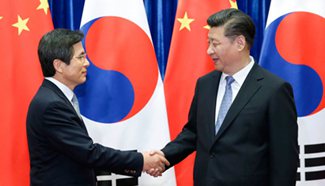BEIJING, June 29 (Xinhua) -- The South China Sea arbitration unilaterally initiated by the Philippines does not hold water from a legal standpoint and will not put an end to the South China Sea disputes, but only worsen them.
It even threatens to further complicate the issue by giving certain parties in the disputes the false impression they could profit by deliberately creating chaos.
The tribunal handling the arbitration case will issue an award on July 12, according to a press release published Wednesday by its registry, the Permanent Court of Arbitration (PCA) in The Hague.
Whatever the verdict might be, the basically illegal nature of the arbitration will make it null and void.
The United Nations Convention on the Law of the Sea (UNCLOS) clearly states that a tribunal will not be entitled to pass judgment on a territorial and boundary dispute.
The tribunal has distorted the UNCLOS by extending its jurisdiction and has overstepped its power to make a judgment on territorial sovereignty.
Despite all the verbal manipulations by the tribunal, which said it would not try to settle sovereignty disputes, but only determine geological features, the Philippines' claims will eventually lead to the question of who owns it.
The arbitration also infringes on China's right to refuse to accept any imposed rulings on territorial and delimitation disputes, which is ensured by the UNCLOS.
Moreover, an arbitration requires the consent of the two concerned parties. China's stance of non-acceptance of and non-participation in the arbitration not only secures its own interests, but also preserves the right of other countries facing a similar situation.
It is protecting the authority and completeness of the UNCLOS within its frame, and that's why China's position on the South China Sea issue has gained more and more countries' understanding and support.
Any just international arbitration is aimed at eventually solving disputes and conflicts and pushing forward the peace process and development. It is unthinkable a tribunal would create chaos or worsen a crisis in its own right.
The UNCLOS also explicitly rules out any infringements on the rights of relevant parties in a conflict to solve their problems through dialogue and negotiations.
China and the Philippines, along with other members of the Association of Southeast Asian Nations (ASEAN), in 2002 signed the Declaration on the Conduct of Parties (DOC) in the South China Sea, which should serve as the political framework for solving the issue.
It's apparent that China and other relevant countries in the region have developed their own effective method by solving the problem through consultations.
By going ahead with the arbitration, Manila has deviated from the right path of putting an end to its dispute with China.
Manila fails to see that such an arbitration will only stir up more trouble in the South China Sea, which doesn't serve the interests of the concerned parties in the least.










